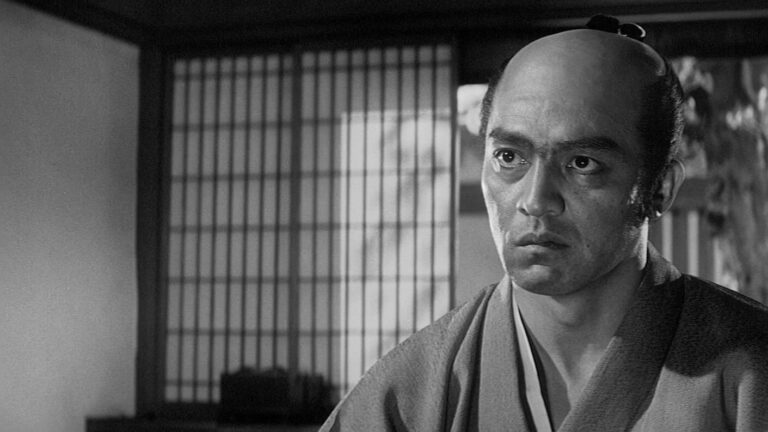Where to Watch:
9.2/10
FilmFascination Rating
Harakiri has some of the best storytelling I have seen. It is at the level Kurosawa achieved with his film Rashomon and stands strong alongside the finest films ever made.
Harakiri is about Tsugumo Hanshiro who comes to the estate Iyi clan to perform Harakiri. For those who don’t know, Harakiri is the ritual performed by samurai of taking their own lives. But Harakiri is considered as the honourable way to die for a warrior. It is performed when the warrior no longer feels the necessity to carry on with their life. So instead of living without purpose, they disembowel themselves as an honorary death.
It is 1630 and most of the clans are without any work due to peace around the world. The samurai warriors aren’t getting food since there aren’t any wars. All of them have moved out of their conventional work to earn a living. A man would go to any lengths to support his family. So as situations become tougher, as life becomes more brutal than before, even the strongest of the men breaks into doing something he never could have imagined.
In the district, there have been many such appeals of performing Harakiri. And instead of giving them permission these ronins (unemployed samurais) were given work by the clan they appealed to. But many clans have now wised up to this tactic. Saito, the counselor of the Iyi clan, does not allow these extortionists. Instead, he forces them to perform Harakiri if they don’t have the guts to do so themselves.
When Tsugumo comes to perform Harakiri, Sairo wants to make sure that he is determined to do what he says he wants to. But when Tsugumo learns about another of the samurais of his clan coming at the Iyi clan to perform Harakiri, the situation changes. So, is Tsugumo here to really perform Harakiri? Or are there some ulterior motives? And what led him to take this extreme step?
The movie will take you through all of this and that too with such great storytelling. Storytelling is an art that not every movie can get right. A story has a narrator, but at the same time, it switches to actual scenes that happened and also switches between the past and present. There are many things that come into consideration on how to handle a storyline. What to hide from the audience, what should the audience be aware of at a particular point of the movie so that the next twist will have maximum impact but at the same time it should not be so extreme that the viewer seems betrayed that a new fact was absurdly thrown at him. All this has to be thought of in the way a story is told. Kurosawa’s Ikiru is one example that nails this part. The second half of the Ikiru is so well crafted that I could just imagine how much Kurosawa must have thought on how to put forth the plot. Harakiri is also one of those movies that is made with great care by Masaki Kobayashi on how the knowledge of the viewer is taken care of as the movie proceeds.


Harakiri is also very culturally oriented (I mean, it has to be). Things happening and the decisions taken are strongly based on the Japanese, moreover the samurai Clans’ culture (what they say as the ‘Way of the Warrior’). Although I believe I have understood everything, it would have been great if someone could have given me more background on the culture. It does not have any references as such that the normal audience wouldn’t get, it is just my fascination that keeps me wanting more information.
I always say one thing. What’s the use of a great plot, if you cannot capture it effectively? The shots and camera movements are beautiful in Harakiri. It has great action sequences, close-up shots during the intense dramatic scenes and even blood slashes when the sword cuts through the flesh. The cinematography and the sets are so good that I literally said ‘Wow’ out loud. It is a mesmerizing movie to watch. There is a Harakiri scene where a person performs the ritual with a wooden sword, and I just can’t get those horrid visuals from my mind now. It was awful to see that, also it was shown so explicitly. All these emotions are amplified by the great acting as well as the script.
Tatsuya Nakadai does a very good job of playing an elder Ronin, who has been through life and seen it all. And the script by Shinobu Hashimoto who has written most of Kurosawa’s film scripts is exceptional as expected. My favourite dialogue from it all being – ‘What befalls others today, maybe your own fate tomorrow’.
Harakiri is a samurai film that is much more thoughtful and profound than the others. It isn’t just about vengeance but also questions the way of the warrior. It shows the human tragedy and the mindsets of the ones in power and the other ronins who work from hand to mouth. All this is combined in a grand experience where the viewers are taken along a journey where the plot peels itself layer by layer, where each layer would make you contemplate of the human race you belong. It is heartbreaking, but again it is what it is.
This was my first movie made by Kobayashi. Next, I’ll be watching Kobayashi’s Kwaidan, and am really excited to explore more of his work.
Join the FilmFascination Club!
All the updates right in your Inbox! (We will never spam you with junk mails)
You will get a message on the top of the form once your subscription is successful.

